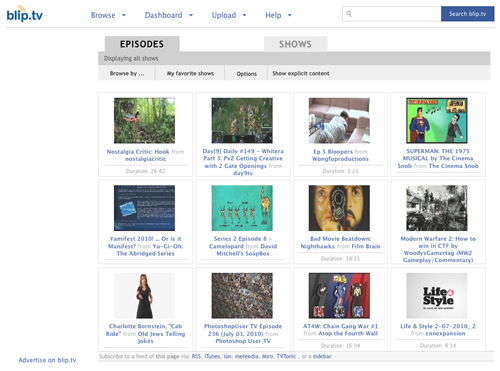The New Networks
Revision3 started out 5 years ago, as an indirect result of Comcast buying cable network Tech TV. The new owner changed the focus of the company, making it more about video games, which was understandably hard to take for many employees and viewers. Five veterans of the company-Prager, Kevin Rose, Jay Adelson, Dan Huard, and Ron Gorodetzky-created a few online shows for fun, for their old geek viewers. When their efforts got more than 10,000 hits, they decided to take it larger.
It helped that a few of the group's other projects were paying off. Adelson's success in starting other companies allowed him to offer the young network $50,000 in seed money, letting Prager and a few others quit their day jobs and live the cash-strapped startup lifestyle. Before long, Rose's site Digg.com became a social news success, allowing the Revision3 crew to go on staff at Digg, while working for both sites. When an angel round of funding provided Revision3 with $1 million, the network could finally stand on its own.
"If you're going to take a leap of faith in something you believe in, that was the way to do it," Prager says. "We kind of made it up as we went along."
While he'd never worked in sales a day in his life, Prager sold ads for the young network. He credits his complete lack of preparation with helping him think out of the box and pull in small, targeted customers.
blip.tv also began in 2005, and its founders had even less experience. Hudack, for example, wrote code and ran servers for the National Hockey League. One member of his group worked in financial printing, and another worked in news casting. They were busy creating a knowledge management platform by working nights at New York City's World Financial Center (because it offered free Wi-Fi) when they saw the online show Rocketboom and knew that this was the future.
The group then stripped out its knowledge management platform and turned it into a way to add videos to a site. The network wasn't an overnight hit with video bloggers, but after overhauling the system and putting content-not technology-first, it attracted hundreds of users.
The Living Room and Beyond
While the three online networks play a valuable role for web surfers, they might become far more influential as they enter the living room. Connected set-top boxes, Blu-ray players, and game consoles will catch on with a mainstream audience in 2010 and 2011, and most of the solutions offer content from one or more of the three online networks.
"One of the great things about having a network is that you can strike a deal with someone and get carriage for the whole network of shows. If we put a Hungry Nation app on Boxee, all the shows that are part of Hungry Nation automatically go there," says Shey, referring to one of NNN's subnetworks. His network has been available on TiVos for 3 years, is on DivX devices, and will be on Popbox and Boxee Box at launch.
"[With the] set-top box explosion, we're all going to see an uptake there, especially as it gets more and more mainstream. It took a while for TiVo. A lot of these early set-top boxes are still something only geeks would set up. There'll be some growth this year, but I think it'll really explode next year as the devices get better and better with faster internet connections and get easier to use. I think we're still in the early days of it," Shey says.
Also excited about the possibilities of living room viewing is blip.tv's Hudack. "The computer is a good mechanism for discovery, but it's a bad mechanism for actually watching content that's longer than 4 or 5 minutes," he notes. blip.tv content is on Roku, TiVo, connected TVs, Blu-ray players, and Boxee.

Hudack would like to see the day when the divisions between broadcast content and online content melt away, and even nontechnical viewers can sit in front of a TV and call up either type without understanding their differences.
If that happens, the online networks could find a mainstream audience and a new level of visibility and respect. No one is counting their money yet, though, as the field is competitive and there's a long way to go before the networks reach the mainstream. But conquering the living room isn't the end goal, as online networks will keep finding new outlets.
"The space is constantly changing, it's constantly evolving. I don't think that things are going to be the same a week from now, let alone a couple years from now," says Ryan Vance, Revision3's vice president of programming and production. "I don't view this space as ever having a plateau; I don't view it as ever having a place where it's going to normalize. We're constantly evolving because the audience is constantly evolving in the way they interact with media and they way they interact with each other."
Related Articles
Two tech-heavy niche networks combine in a deal worth a rumored $30M to $40M.
03 May 2012
Long a rumor, YouTube has purchased Next New Networks in its first significant acquisition of a content creation company.
08 Mar 2011
Exclusive show will feature two-minute long commentaries from online personalities.
09 Nov 2010
Successful two-day event impresses with creativity, shows that conferences don't need to be stuffy.
11 Oct 2010
Hip and funny video producer will use funds to bolster sales and development teams.
09 Aug 2010